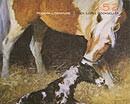Catalog 152, L

118. LE CARRÉ, John. Typed Letter Signed. 1967. One page, dated 20th November. Le Carré (using his real name, David Cornwell), writes that he and his wife, Ann, enjoyed the recipient's poem, and that he had had to give up his tour half way across Canada "because it really became too much for me" but notes that he and Ann appreciated the hospitality the recipient had shown when he visited. Cornwell invites the recipient and his wife to visit if/when they come to England. Signed "David." Folded in thirds for mailing; one faint cup ring over the address; near fine.
119. LEE, Harper. To Kill a Mockingbird. (NY): HarperCollins (1999). The first printing of the 40th anniversary edition of her Pulitzer Prize-winning novel, which was made into an Academy Award-winning film. This copy is signed by the author. Reprints the foreword by Lee that appeared in the 35th anniversary edition in 1995. Fine in a fine dust jacket. Both anniversary editions went into multiple printings; first printings are uncommon, especially signed.
120. (LEE, Harper). To Kill a Mockingbird: The Finch Family and Their Negro Cook. Braunschweig: Georg Westermann (c. 1966). An English Language text for a German audience, printing abridged portions of Chapters 1-3 and 10-12 of To Kill a Mockingbird, 59 pages, with more than 30 pages of annotations defining English terms in the novel, such as "being Southerners," "mockingbird" and "Hey," in English. Also prints a one-page biographical note about Lee, (here said to be writing her second novel), in part: "'Aside from writing,' says Miss Lee, 'my chief interests in life are collecting memoirs of nineteenth century clergymen, golf, crime and music.'" Two sections: notes and appendix, stapled into front and rear covers respectively, in folder-style wrappers. Owner name inside front cover and pencilled notes (mostly underlining) in text. Tiny bumps to spine ends; near fine. Uncommon; we have never seen another copy of this.
121. LeGUIN, Ursula. The Dispossessed. NY: Harper & Row (1974). LeGuin's award-winning masterpiece, "the most thoroughgoing utopian vision in modern SF" (Pringle). One of Pringle's hundred best science fiction novels, this book won both the Hugo and Nebula Awards for Best Novel, and was a runner-up for the John W. Campbell Memorial Award. A serious novel of ideas, using science fiction to explore issues of moral, social and political significance, including a careful explication of modern trends in libertarian thought and anarchism. This copy is inscribed by LeGuin to science fiction writer and feminist critic Joanna Russ: "With love to Joanna whom I hope to meet on Anarres or in Paradise/ Ursula/ 1974." With Russ's notes throughout and four pages of detailed feminist critique on the front pastedown through the title page. With Russ's address label on front flyleaf. Obviously a read copy: near fine in a near fine dust jacket. Above all, a spectacular association copy: Russ is a Hugo and Nebula Award winner herself and her first three novels -- Picnic on Paradise, And Chaos Died and The Female Man -- were all nominated for Nebula Awards. She is widely acknowledged as one of the leading feminist scholars and writers of science fiction. LeGuin has been one of the leading figures in science fiction and fantasy writing for over 40 years. She has won five Hugo Awards and six Nebulas and was awarded the Gandalf Grand Master Award in 1979 and the Science Fiction and Fantasy Writers of America Grand Master Award in 2003. She won a National Book Award in 1973 for one of the books in her Earthsea series, and she was given the Library of Congress "Living Legends" award in 2000 for her contributions to America's cultural heritage. The daughter of noted anthropologists, LeGuin made her mark in the science fiction field by writing novels that explored serious social, cultural and anthropological issues, including issues of sexual identity and what it means to be human, and also ecological issues. Russ cites the utopian society of The Dispossessed in her influential essay "Recent Feminist Utopias" in her book To Write Like a Woman: Essays in Feminism and Science Fiction and notes that her own feminist utopian science fiction novel, The Female Man, was published in 1975, just a year after LeGuin's book. Russ's extensive notes are practically a manuscript in themselves, and LeGuin's inscription alludes to her fictional utopia -- Anarres. The two had an ongoing correspondence, as one might expect, stretching over decades, beginning shortly before this book was published. One of the best association copies we have ever seen of a science fiction novel, linking two of the most important figures responsible for elevating the genre from male-dominated, hardware-oriented shoot-'em-ups to a serious vehicle for philosophical speculation and meaningful social commentary.
122. LEONARD, Elmore and NEWMAN, Paul. Hombre. (n.p.): Twentieth Century-Fox, 1967. Press kit for the film version of the first major commercial movie success to be derived from a Leonard novel. Includes a 10" x 8" black-and-white glossy of Leonard, signed by Leonard, fine; and an 8" x 10" color glossy of the star, Paul Newman, signed by Newman, also fine. Also includes one-sheet, 14" x 22", creased at top, near fine; lobby card, 14" x 11", fine; 12-page pressbook, with one excision from the "scene mats" page, thus very good in illustrated cardstock covers; an additional, abridged pressbook, also with excisions. For all:
123. LOPEZ, Barry. Under Western Skies. San Francisco: Browntrout, 1998. Calendar for the year 1999, with landscape photographs from Western states, and all text by Barry Lopez, taken from a 1997 Portland Magazine essay entitled "A Literature of Place." Fine, shrinkwrapped.